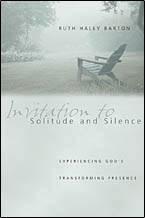An Invitation to Solitude and Silence


My favorite picture of Ruth Haley Barton is of her on her knees in the ladies' room. It's my wedding day and she's painting my toenails. Twenty-six years after Ruth was my bridesmaid, she is the winner of the 2005 Christianity Today book of the year award in the Spirituality category for her book, Invitation to Solitude and Silence. If you don't know her already, I'd like to introduce you to my beloved friend through an interview done by her publisher, IVP:
IVP: Why do you think words like solitude and silence are so difficult to grasp and implement into our lives?
Ruth Haley Barton: Solitude and silence challenge us on every level of our being. They challenge us culturally because nothing in our culture supports quietness and non-activity. Technology now intrudes on every aspect of our lives, and the idea of not being continually available by cell phone, beeper, and palm pilot is now almost unheard of. Solitude and silence challenge us on the level of our relationships because it means that for this period of time we are not available to the people in our lives, and those we care about may resist our lack of availability. Solitude and silence challenge us psychologically because the psyche knows that if we become quiet, we will have to face those inner realities and emotions that we would prefer to avoid by distracting ourselves with noise an d activity. Solitude and silence challenge us spiritually because all the forces of evil seek to prevent us from entering in because when we become truly still we experience and know God in ways that will unseat Satan's power and dominion in our lives. "Be still and know . . ."
IVP: What inspired you to write Invitation to Solitude and Silence?
Barton: I was inspired to write Invitation to Solitude and Silence out of my own journey into solitude and silence that began when I came to the end of what the traditional "quiet time" had to offer. Silence and solitude have yielded powerful results--connection with God and authentic spiritual transformation--in my own spiritual life that have not come in any other way.
IVP: Briefly describe the journey into the disciplines of solitude and silence.
Barton: The chapter titles--"Entering in," "Resistance," "Dangerously Tired"--really capture the journey into solitude and silence. There is the initial sense of being invited to enter in--often due to desire and longing for more of God or desperation about what is unfixed in our lives. There is our initial resistance that we must often push through because we are afraid or don't know what to do. We might also experience our distractibility and chaotic inner world, and we will need to allow this to settle as we learn how to rest ourselves in God. There is also the experience of emptiness and self-knowledge that can be very disconcerting; but if we wait in the empty place, God eventually gives us a greater sense of his presence and wisdom for moving forward with our lives in ways that are good for ourselves and for others.
IVP: Why are solitude and silence such essential disciplines?
Barton: Solitude and silence are the core disciplines of the spiritual life because they are "container" disciplines that create the time and space for other private disciplines. These disciplines are also powerfully concrete ways of giving up control and allowing God to take the initiative in our lives. We move beyond our addiction to words, noise and activity to shore up our identity and allow God to reveal a more authentic self.
IVP: What is your hope for Invitation to Solitude and Silence?
Barton: My hope for Invitation to Solitude and Silence is that people will not merely read about these disciplines but that they will enter into the disciplines using the practices that are provided. My prayer is that they will feel that they have a companion or a spiritual director and consequently, they will feel safe and guided and reassured throughout their experiences. I pray that they will encounter God in ways that are satisfying and life-changing. For more on Ruth (left): www.thetransformingcenter.org/
